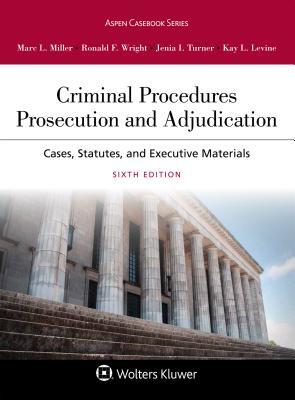Read online Criminal Procedures: Prosecution and Adjudication - Marc L. Miller | PDF
Related searches:
Criminal Procedures: Prosecution and Adjudication: Cases
Criminal Procedures: Prosecution and Adjudication [Connected
Buy Criminal Procedures: Prosecution and Adjudication (Casebook
Questions and Answers: Criminal Procedure -- Prosecution and
Criminal Procedures: Prosecution and Adjudication : Cases
Rule 18. Place of Prosecution and Trial Federal Rules of
Criminal Procedures : Prosecution and Adjudication 3rd
The basics of criminal law: presumption of innocence, felonies, misdemeanors, and jury trials. All people accused of a crime are legally presumed to be innocent until they are convicted, either in a trial or as a result of pleading guilty.
Important steps in the federal criminal process: investigation; charging; initial hearing/arraignment; discovery; plea bargaining; preliminary hearing; pre-trial motions; trial; post-trial motions; sentencing; appeal.
Where the criminal proceedings of a case were conducted pursuant to special in this code refers to a public prosecutor, a private prosecutor, or an accused.
Prosecution shall have jurisdiction to initiate and pursue criminal actions before competent courts.
In criminal procedures: prosecution and adjudication: cases, statutes, and executive materials, sixth edition, the highly respected author team presents a student-friendly, comprehensive survey of the laws and practices at work between the time a person is charged and the moment when the courts hear an appeal after the offender’s conviction and sentence. In the sixth edition, the authors retain the vitality and contemporary approach of the book with an updated selection of cases, statutes.
Office of criminal investigations home page the�gov means it’s official. Before sharing sensitive information, make sure you're on a federal government site.
Offering a detailed account of the bail to jail segment of the criminal process, criminal procedures: prosecution and adjudication, third edition, lays out the essentials of this process.
Was the murderer the last person known to see the victim alive or was it someone else? this agatha christie courtroom drama keeps you guessing.
Unless a statute or these rules permit otherwise, the government must prosecute an offense in a district where the offense was committed. The court must set the place of trial within the district with due regard for the convenience of the defendant, any victim, and the witnesses, and the prompt administration of justice.
A state may punish a certain crime more harshly than the federal government (or vice versa), but a defendant can be charged and convicted under both systems. The federal rules for criminal cases can be found in the federal rules of criminal procedure, which govern all aspects of criminal trials.
Most people will never find themselves in a position where they face legal charges. However, in some cases, individuals make one stupid mistake and have to face a judge or jury. This terrifying process can lead to being acquitted of a crime.
1 these rules may be cited as the criminal procedure rules, 2016. 1 in these rules, unless the context otherwise requires– “accused” means a person against whom a complaint is made,.
The lawyer may even choose not to give an opening statement, perhaps to emphasize to the jury that it's the prosecution's burden to do the convincing. The prosecution presents its main case through direct examination of prosecution witnesses.
“criminal prosecution” is criminal procedure designed to establish the criminal act, incriminate the person who committed the offence covered by criminal law,.
The term encompasses procedures that the government must follow during the entire course of a criminal case, ranging from the initial investigation of an individual suspected of criminal activity, through arrest, arraignment, plea negotiations, pre-trial hearings, trial, post-trial motions, pre-sentence interviews, sentencing, appeals, and probation and parole proceedings.
Criminal procedure addresses the procedures involved in the investigation, detection, and prosecution of criminal offenses. The standard by which people are convicted and the prosecutor must prove at trial.
The united states constitution requires prosecutors to provide the defense with any evidence that might hurt the prosecution’s case, called exculpatory evidence. Plea bargaining is the most common way criminal cases are resolved. A plea bargain is an agreement between the defendant and the prosecution to resolve a criminal.
In criminal procedures: prosecution and adjudication: cases, statutes, and executive materials, sixth edition, the highly respected author team presents a student-friendly, comprehensive survey of the laws and practices at work between the time a person is charged and the moment when the courts hear an appeal after the offender's conviction and sentence. In the sixth edition, the authors retain the vitality and contemporary approach of the book with an updated selection of cases, statutes.

Post Your Comments: